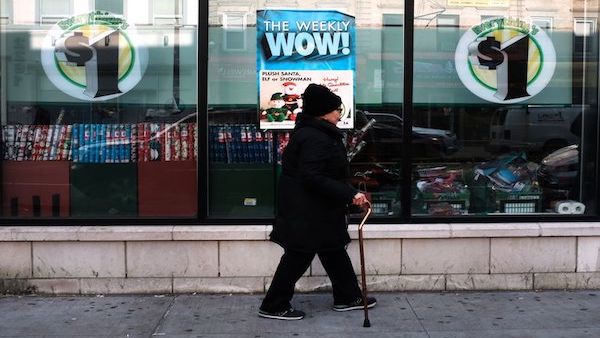 Spencer Platt / Getty Images
Spencer Platt / Getty Images
STUDY FINDS TOXIC CHEMICALS IN MANY DOLLAR STORE PRODUCTS
KATHERINE MARTINKO
54% of items tested contained 1 or more chemicals of concern.
For many Americans, dollar stores are their go-to destination for buying food, toys, cleaning supplies, and other household goods. Dollar stores sell so much food that they're now among the top 25 food retailers in the United States. Their physical numbers are surging, with more locations across the country than Walmarts and McDonald's combined. In 2018, Dollar General was opening stores at a rate of three per day and it plans to build or renovate 1,850 locations in 2021.
This might sound like a good idea—improving access to shopping, particularly for Americans in lower-income neighborhoods who may not have transportation or funds to shop at larger grocery stores—but it raises other concerning issues. A study conducted by the Campaign for Healthier Solutions just found that 54% of products sold in dollar stores contain at least one chemical of concern.
The report tested 300 different products (including consumer products, food, microwave popcorn, and electronics), as well as paper receipts, using several different test methods to determine what they contained. The results were alarming—lead solder in electronics, flexible plastics with PVC that has been banned or regulated, canned foods with BPA liners, pans and cookware coated with non-stick PFAS chemicals, microwave popcorn with PFAS coatings, and BPS (bisphenol S) in receipts . These chemicals have been linked to asthma, low birth weights, cancer, immune system problems, learning disabilities, diabetes, and other serious health problems.
"One hundred percent of all receipts from all dollar stores came back with BPS—a substitute for BPA, but not a good one because it's hazardous," José Bravo, national coordinator for the Campaign for Healthier Solutions, tells Treehugger. "We touch that receipt one time, but the workers touch that receipt maybe 400-500 times per day. So we want to limit exposures to workers. It's not just about consumers, it's about the environment as well."
While other retailers are taking action on this issue of exposure, dollar stores are dragging their feet. Bravo did not comment on the progress made by non-dollar store retailers (he directed readers to the fifth annual Mind the Store report card instead), but he points out: "If others are making change, why not dollar stores?"
One of his concerns is dollar stores often target areas where there are higher rates of ongoing contamination from sources that include some of the chemical manufacturing that ends up in products on store shelves. "So our communities share a disproportionate impact that [other] communities do not," says Bravo.
Why are dollar stores reluctant to phase out toxic chemicals and clean up their supply chains? Bravo cites three main reasons. One is they don't know how to start such a daunting process of figuring out how to remove things. Second, they have liability concerns. "If they find there are issues with some of their products and it can be tied back to something, they believe it opens their liability," says Bravo. Thirdly, it's about the money. "Some stores, I believe, are greedy," he notes, "and would rather make money than think about issues that are second- or third-hand."
The report shows Dollar Tree/Family Dollar is doing better than its competitors. A press release states the brands have "publicly released a chemical policy, a commitment to eliminate priority chemicals, and a pollinator protector policy, and have stated in private that they plan to expand the number of chemicals that they are phasing out, as well as the number of products they will be cleaning up."
Bravo, who attended Dollar Tree's shareholder meeting the same day he spoke to Treehugger, says its CEO expressed willingness to remove phthalates and PFAS chemicals, which is a huge step considering each store contains 5,000+ products and there are over 4,000 types of PFAS chemicals.
By contrast, Dollar General "comes in kicking and screaming," with a chemical policy that is, in Bravo's words, "not the strongest policy." Furthermore, the chain has not "responded to any recent communication from the Campaign for Healthier Solutions about expanding their list of restricted substances and product categories that they are focusing on."
99 Cents Only stores, found primarily in California and the Southwest, have made no effort to phase out toxic chemicals. It earned an F grade in the Mind the Store report card for the third year in a row.
What's the Solution?
All of these companies could start by phasing toxic chemicals out of their store brand products, where they have more clout over manufacturers. This is what Walmart did, and the approach can be effective.
"We want them to step up to the plate and be a bit more transparent about what they're doing," Bravo tells Treehugger. "We've always said, the more you do these things, the better it is for your consumers, for shareholders, for your bottom line, for your liability—all these things put together."
As for the concern that "going green" might increase prices that would put dollar store products beyond the range of low-budget shoppers, Bravo dismisses the notion. "It's not proven to be that way. We are talking about engineering fixes," he says. "If you put out a cup, ask your supplier not to add the phthalates to that cup. It's not more expensive, and it's something that their suppliers can do."
Some products might become more expensive, like fresh produce, but reasonable solutions do exist, such as the ongoing conversation the Campaign for Healthier Solutions has been having with Dollar General for over a year and a half, about selling fresh produce gathered from local community gardens:
"We have 14 community gardens without pesticides, willing to pull bundles of produce together for stores to sell at whatever price they want that would be cost-effective," says Bravo. "They started talking [with us] and now it's not prioritized, but that's [an example of a] solution."
Bravo goes on, "Customers want it. They're for it." But it shouldn't be up to them to avoid chemical exposure when shopping at dollar stores; it's the manufacturer's responsibility to keep customers safe by creating tougher corporate chemical policies.
There are practical considerations that a group like the Campaign for Healthier Solutions could reference, such as urging people to avoid aisles that reek of plastic, but Bravo says it has to go beyond that.
"It has to reach a point where folks can shop without thinking that they're being poisoned—or unknowingly being poisoned," he says. "It's the responsibility not of the consumer, but of the retailer to make sure that its products are safe for everyone."
Read Next
:
The Dollar Store is America's New Invasive Species

